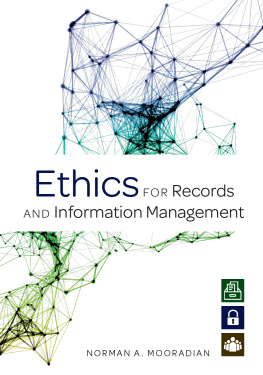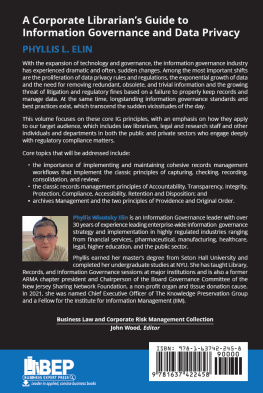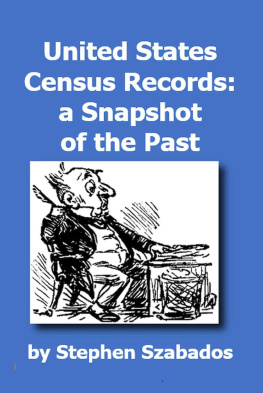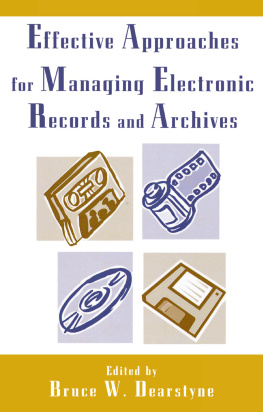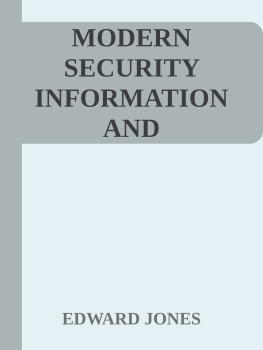Cover
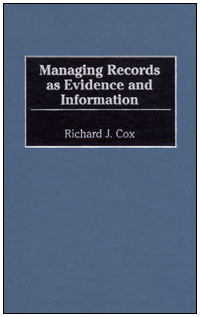
| title | : | Managing Records As Evidence and Information |
| author | : | Cox, Richard J. |
| publisher | : | Greenwood Publishing Group |
| isbn10 | asin | : | 1567202314 |
| print isbn13 | : | 9781567202311 |
| ebook isbn13 | : | 9780313000713 |
| language | : | English |
| subject | Archives--Administration, Records--Management. |
| publication date | : | 2001 |
| lcc | : | CD950.C694 2001eb |
| ddc | : | 025.1/97 |
| subject | : | Archives--Administration, Records--Management. |
Page i
Managing Records as Evidence and Information
Page ii
This page intentionally left blank.
Page iii
Managing Records as Evidence and Information
Richard J. Cox

Page iv
Library of Congress Cataloging-in-Publication Data
Cox, Richard J.
Managing records as evidence and information / Richard J. Cox.
p. cm.
Includes bibliographical references and index.
ISBN 1567202314 (alk. paper)
1. ArchivesAdministration. 2. RecordsManagement. I. Title.
CD950.C694 2001
025.197dc21 00032812
British Library Cataloguing in Publication Data is available.
Copyright 2001 by Richard J. Cox
All rights reserved. No portion of this book may be reproduced, by any process or technique, without the express written consent of the publisher.
Library of Congress Catalog Card Number: 00032812
ISBN: 1567202314
First published in 2001
Quorum Books, 88 Post Road West, Westport, CT 06881
An imprint of Greenwood Publishing Group, Inc.
www.quorumbooks.com
Printed in the United States of America

The paper used in this book complies with the
Permanent Paper Standard issued by the National
Information Standards Organization (Z39.481984).
10 9 8 7 6 5 4 3 2 1
Page v
Contents
Preface | vii |
1. Starting Policy: Defining Records | |
2. Driving Policy: Focusing on Records, Not Technology | |
3. The Policys Spine: Appraising and Maintaining Records | |
4. The Policys Aim: Reaching the Public | |
5. Supporting Policy: Educating Records Professionals | |
Index | |
Page vi
This page intentionally left blank.
Page vii
Preface
The concept of policy has been used so often and so broadly in the modern Information Age as to become both commonplace and misunderstood. Federal policies seem to be issued weekly. In our global era, international organizations regularly call for and release policies. All organizations seem to desire a policy on every function and activity or, at the least, to be aware of external policies affecting their work. Citizens demand policies protecting them in a vast range of spheres, from privacy to consumer rights to the use of information generated by and for them. Many worry if they might be working unaware of some policy that should be guiding them, or commence a new project by searching for and being aware of relevant policies.
The nature and impact of policies is a prevalent concern but also constitutes a somewhat uncertain business. Not long ago my school hosted a public lecture on information policy and ethics. During the question-and-answer session, one of my students politely but astutely posed a question about the differences between law and policy. Not unexpectedly, the answer was somewhat muddled, not because the speaker didnt know how to respond but because it is difficult to discern where law ends and policy begins or how policy differs from so many other rules, guidelines, or even common sense. Law and policy are intertwined in complex ways, and because the process and effectiveness of making laws regarding cyberspace are both very complicated and uncertain, it can only be said that laws constitute part of policy and that policy often supports the application of laws. All of this, of course, is then subject to the outcomes of court cases and the development of professional best practices.
Some of this is not new, only speeded up and exacerbated by the accelerating use of computers from classrooms to courtrooms. Historian Michael Kammen identifies the most worrisome threats to our freedom as coming from the
Page viii
misuse of electronic data bases, from imprudent government legislation, from environmental degradation, and from those whose business it literally is to manipulate the marketplace. Policies are being proposed to address these and other concerns. Sometimes they help, sometimes they muddle things more.
The idea of policy has been used freely for hundreds of years. The word itself derives from the Greek concepts of citizenship and government and later focused on organized government systems, the conduct of public affairs, political skill, and the most current concept of any course of action adopted and pursued by a government, party, ruler, statesman, etc. Now private organizations are also wrapped up in deliberations about policy, generally meant to relate to internally uniform or regulated actions. And many of these policies, both private and public, relate to the use of information and records, drawing on another aspect of the origins of policy. Policy has long been associated with particular records policing action, such as an insurance policy, vouchers, and warrants. But it has been the Information Age that has added an impetus to policy making, not just for information but the unique kind of information provided by recordsevidence.
A useful discussion about the nature of policy is found in a monograph by H. K. Colebatch, a political scientist. Colebatch indicates that in government a policy has coherence (all the parts fit together in a single system), emanates from the top of the hierarchy, and possesses instrumentality (the policy is written in pursuit of particular purposes). Colebatch also indicates that in nongovernment organizations the term policy is often simply the standardization and articulation of practice. All policies, regardless of the nature of the organization producing them, generate from authority, implies expertise, and are concerned with order (they build or relate to a system and are consistent).
For the past three decades, policies regarding a variety of information issues have emanated from federal agencies, legislative chambers, and corporate boardrooms. Charles McClure defines information policy as a term used to describe a set of interrelated principles, laws, guidelines, rules and regulations, directives, procedures, judgments, interpretations, and practices that guide the creation, management, access, and use of information. Information policy can be set at a national level... , by state and local governments, and by other agencies and institutions. A quick substitute of records for information, and we have a reasonably good sense of the
Next page

